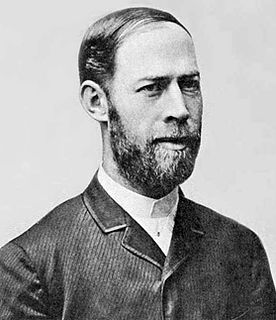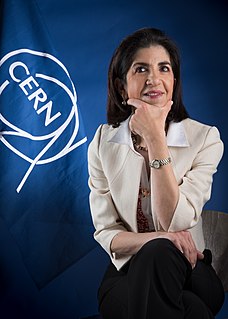A Quote by Edwin Powell Hubble
Equipped with our five senses - along with telescopes and microscopes and mass spectrometers and seismographs and magnetometers and particle accelerators and detectors sensitive to the entire electromagnetic spectrum - we explore the universe around us and call the adventure science.
Related Quotes
I argue that science would be much richer if it were multisensory. The problem with instrumentation is that instruments, unlike our senses, can be monosensory. Since the discovery of the electromagnetic spectrum - which is really the discovery that all energy coming from something has a wave form - in theory we could image anything along that spectrum. In fact, we don't, because only certain parts of the spectrum have been instrumentalized. But the new thing is computerization. You can take all the data, the measurement of the frequencies, and transform it into an image.
Everything we know about the universe is studied by using telescopes or other instruments that look at visible light, infrared, ultraviolet or X-ray - different wavelengths of electromagnetic interactions. Only 4 percent of what's in the universe gives off electromagnetic radiation, so we don't have any handle on the rest.
Sometimes I really regret that I did not live in those times when there was still so much that was new; to be sure enough much is yet unknown, but I do not think that it will be possible to discover anything easily nowadays that would lead us to revise our entire outlook as radically as was possible in the days when telescopes and microscopes were still new.
When we look at the universe, what we see by eye or with our telescopes is only five percent of the universe. The rest, 95 percent is dark. Dark meaning, first of all, not visible to our instrument. Second, dark also indicates our ignorance. We don't know what's the composition of this part of the universe.
Magic is really only the utilization of the entire spectrum of the senses. Humans have cut themselves off from their senses. Now they see only a tiny portion of the visible spectrum, hear only the loudest of sounds, their sense of smell is shockingly poor and they can only distinguish the sweetest and sourest of tastes.
Judaism calls for us to honor the rhythm of human life, the demands of the human community around us, the call of the divine order as the filter and scale for the decisions that drive our own small lives. We do not rule the universe, Judaism reminds us. God does. We are not its standard or its norms. We are only its keepers, its agents, its stewards. To do right by the universe at large is the measure of a happiness framed with the entire cosmos in mind but lived in microcosms across time.
The brain, which operates on electromagnetic impulses, is as much an activity of the universe as are the electromagnetic storms in the atmosphere or on a distant star. Therefore science is one form of electromagnetism that spends it time studying another formscience is god explaining god through a human nervous systemisn't spirituality the same thing?




































